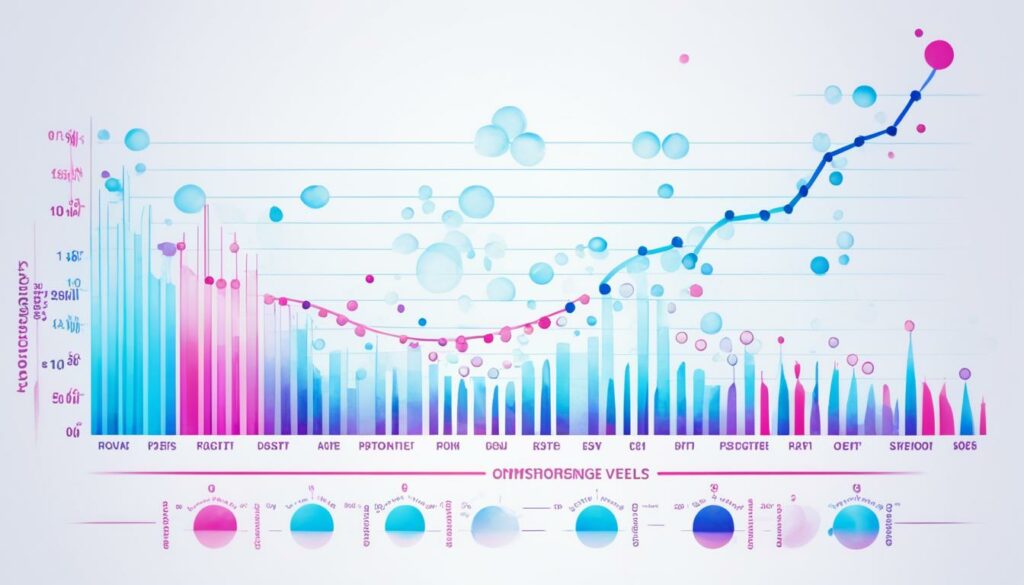Teen Hormones & Emotions: Understanding the Role
Adolescence is a transformative phase in a teenager’s life, characterized by physical, hormonal, and emotional changes. During this time, hormones such as estrogen, progesterone, and testosterone play a significant role in shaping a teen’s emotions. Understanding the impact of hormones on emotional health is vital for parents and caregivers seeking to support their teens through this complex period.
Key Takeaways:
- Hormones like estrogen, progesterone, and testosterone greatly influence a teenager’s emotional well-being.
- Emotional health during adolescence is crucial for self-esteem, relationships, and academic performance.
- Puberty triggers hormonal changes that can lead to mood swings and fluctuations in energy levels.
- Estrogen and progesterone affect mood regulation, while testosterone impacts emotions in both boys and girls.
- Understanding these hormonal changes and their impact is essential for supporting teen emotional well-being.
The Significance of Emotional Health During Adolescence and an Overview of Hormonal Changes

Emotional health plays a vital role during adolescence. It influences a teen’s self-esteem, social relationships, and academic performance. Additionally, hormonal changes during puberty can have a significant impact on a teenager’s emotional well-being. Hormones such as estrogen, progesterone, and testosterone are not only responsible for physical changes but also play a crucial role in mood regulation.
Puberty triggers a surge in these hormones, leading to emotional lability, mood swings, and fluctuations in energy levels. Understanding the interplay between emotional health and hormonal changes is essential for parents, caregivers, and educators to provide the necessary support and promote well-being.
Puberty: Unveiling the Hormonal Symphony

Puberty is a transformative phase marked by both physical and emotional changes, fueled by complex hormonal shifts. During this period, the hypothalamus releases Gonadotropin-Releasing Hormone (GnRH), which stimulates the pituitary gland to produce Follicle Stimulating Hormone (FSH) and Luteinizing Hormone (LH). These hormones play a crucial role in the orchestration of puberty, directing the development of primary and secondary sexual characteristics.
In response to FSH and LH, the sex glands in females (ovaries) and males (testes) produce the sex hormones estrogen and testosterone, respectively. These sex hormones are responsible for the physical changes associated with puberty, such as breast development in females and the deepening of the voice in males. However, their impact reaches beyond physical development, influencing emotional health and well-being.
The interplay between hormonal changes during puberty and emotional health is complex. Estrogen, for instance, is not only involved in physical development but also has an influence on mood regulation. testosterone, on the other hand, plays a role in emotional health and behavior in both boys and girls. Understanding the role of GnRH, FSH, and LH hormones in puberty is essential for comprehending the emotional experiences and challenges faced by teenagers during this transformative phase of life.
The Role of GnRH, FSH, and LH Hormones in Puberty:
- Gonadotropin-Releasing Hormone (GnRH): Released by the hypothalamus, GnRH stimulates the pituitary gland to produce FSH and LH.
- Follicle Stimulating Hormone (FSH): Produced by the pituitary gland, FSH stimulates the sex glands (ovaries in females and testes in males) to mature and release sex hormones.
- Luteinizing Hormone (LH): Also produced by the pituitary gland, LH works in conjunction with FSH to stimulate the production of sex hormones and trigger the release of mature eggs in females.
These hormonal changes are not only vital for the physical development of teenagers but also contribute to their emotional well-being. By understanding the hormonal symphony that unfolds during puberty, we can better support and guide teenagers through this period of growth and transformation.
Estrogen and Progesterone Changes in Teens

During adolescence, the role of estrogen and progesterone in emotional health cannot be overstated. Estrogen, often referred to as a “mood-modulator,” plays a crucial role in the production and regulation of serotonin, a neurotransmitter that affects mood. Fluctuations in estrogen levels can result in mood swings, irritability, and anxiety, particularly in teenage girls.
On the other hand, progesterone, considered estrogen’s counterpart, has a more complex relationship with emotional health. While progesterone generally has calming effects, a drop in progesterone levels can trigger mood swings and exacerbate feelings of anxiety or depression.
To better understand the impact of these hormone fluctuations, let’s take a closer look at the role of estrogen and progesterone in emotional health:
The Role of Estrogen
Estrogen plays a vital role in emotional health by regulating mood through its influence on serotonin, a neurotransmitter associated with feelings of well-being and happiness.
“Estrogen helps maintain healthy serotonin levels in the brain, promoting stable moods and positive emotions. Fluctuations in estrogen levels can disrupt serotonin balance, leading to mood swings and emotional instability.”
Teenage girls experience regular fluctuations in estrogen levels due to the menstrual cycle. These hormonal changes can give rise to emotional variations, affecting their overall well-being.
The Complex Relationship with Progesterone
Progesterone, often referred to as the “calming hormone,” has a unique role in emotional health. It can help alleviate anxiety, promote relaxation, and regulate emotions. However, a decline in progesterone levels can have adverse effects on emotional well-being.
During the menstrual cycle, progesterone levels naturally drop before menstruation. This drop in progesterone can contribute to irritability, mood swings, and increased emotional sensitivity in teenage girls.
“Understanding the delicate balance between estrogen and progesterone is essential to comprehending the emotional health of adolescent girls. Fluctuations in these hormones can significantly influence their emotional well-being.”
Hormonal Changes and Emotional Effects in Teens
| Hormones | Emotional Effects |
|---|---|
| Estrogen | Mood swings, irritability, anxiety |
| Progesterone | Mood swings, exacerbation of anxiety or depression |
In summary, estrogen and progesterone play significant roles in the emotional health of teenagers. Fluctuations in estrogen levels can lead to mood swings and anxiety, while a drop in progesterone levels can trigger mood swings and worsen feelings of anxiety or depression. Recognizing the impact of these hormone changes is crucial for supporting and promoting the emotional well-being of teens during their transformative adolescent years.
Testosterone Changes in Teens
During adolescence, testosterone, often associated with masculinity and physical development, also plays a significant role in emotional health. It has an impact on mood and behavior in both boys and girls.
High levels of testosterone can lead to increased aggression and impulsivity, while low levels may contribute to fatigue, depression, and decreased well-being. The interplay between testosterone and emotions is a critical factor in understanding the emotional experiences of teenage boys and girls.
It is important to note that testosterone does not exclusively influence males; it also affects the emotional health of females. By gaining insight into the impact of testosterone on emotions, we can better navigate the emotional landscape of teenagers and provide appropriate support.
Furthermore, while testosterone is often associated with negative emotions such as anger or aggression, it also plays a role in positive emotional experiences. Research suggests that testosterone can enhance feelings of confidence, motivation, and happiness.
To better comprehend the effects of testosterone on emotions, let’s explore the various emotional states that can arise from testosterone fluctuations in teenage boys and girls:
- Increased aggression and impulsivity
- Heightened confidence and motivation
- Feelings of happiness and well-being
- Fatigue, depression, and low mood
Understanding these emotional states can help parents, educators, and healthcare professionals support teenagers in managing their emotions effectively. By offering guidance, promoting open communication, and fostering emotional well-being, we can help adolescents navigate the challenges of hormonal changes and facilitate positive emotional development.
The Impact of Hormonal Changes on Emotional Health

During adolescence, hormonal changes can have a profound impact on emotional health. As teenagers go through the transformative phase of puberty, they often experience a range of emotional challenges that can affect their overall well-being.
One of the most common emotional challenges in adolescence is mood swings. Hormonal fluctuations, especially in estrogen, progesterone, and testosterone levels, can lead to frequent shifts in mood. Teenagers may find themselves experiencing intense emotions that can change rapidly from happiness to sadness or irritability. These mood swings can be confusing and overwhelming for both teens and those around them.
The hormonal changes in adolescence can also make teenagers more sensitive to stress. What might be a minor concern to an adult can feel like a huge burden to a teenager due to the impact of hormones on their mental well-being. This increased sensitivity to stress can contribute to anxiety and other mental health issues in some teenagers.
In addition, hormonal changes can also affect how teenagers regulate their emotions. Teenagers may struggle with emotional regulation, finding it difficult to manage their feelings effectively. This can manifest as impulsive behavior, outbursts of anger, or difficulty expressing emotions in a healthy way. It’s important for parents, caregivers, and educators to provide support and guidance in helping teenagers develop healthy coping mechanisms for emotional regulation.
Impact on Mental Health, Self-esteem, and Social Relationships
The impact of hormonal changes on emotional health goes beyond mood swings and emotional regulation. These changes can also have a significant impact on mental health, self-esteem, and social relationships.
Hormonal imbalances can exacerbate feelings of anxiety and depression in teenagers. The fluctuations in hormones can contribute to the development or worsening of these mental health conditions. It’s crucial to recognize the signs of anxiety and depression in teenagers and seek appropriate help to address these issues.
Furthermore, hormonal changes during adolescence can also influence self-esteem. Teenagers may struggle with body image concerns or perceive themselves differently due to the physical changes brought about by puberty. This can have a direct impact on their self-confidence and overall self-esteem.
In terms of social relationships, hormonal changes can affect how teenagers interact with their peers. Teenagers may experience changes in their desire for social connection, establish new friendships, or feel an increased need for independence. The emotional challenges they face during this period can also strain relationships with parents and family members.
It’s important to provide teenagers with a supportive environment where they feel safe expressing their emotions and navigating these emotional challenges. Open communication, understanding, and empathy can help teenagers develop resilience and maintain healthy social relationships.
Maintaining Emotional Well-being in Teenagers
While hormonal changes can present emotional challenges for teenagers, there are strategies that can help support their emotional well-being during this phase of life.
“Hormonal changes during adolescence can be like riding a roller coaster. It’s important to hold on tight, communicate about your feelings, and seek help when needed. Remember that you’re not alone in this journey.”
Here are some tips for maintaining emotional well-being in teenagers:
- Encourage open communication and active listening: Create a safe space for teenagers to express their emotions and concerns. Show empathy and actively listen to their feelings without judgment.
- Provide emotional support: Be there for teenagers during challenging times. Offer reassurance, guidance, and encouragement to help them navigate their emotional challenges.
- Promote healthy coping strategies: Encourage teenagers to engage in activities that help them manage stress and regulate their emotions. This can include exercise, mindfulness practices, journaling, or talking to a trusted adult or therapist.
- Establish a routine: Help teenagers establish a daily routine that includes enough time for sleep, physical activity, and relaxation. A well-rounded routine can help support emotional well-being.
- Teach problem-solving skills: Help teenagers develop problem-solving skills to effectively deal with challenges they may encounter. Encourage them to brainstorm solutions, weigh pros and cons, and consider different perspectives.
By understanding the impact of hormonal changes on emotional health and implementing supportive strategies, parents, caregivers, and educators can contribute to the overall well-being of teenagers during this transformative phase of life.
| Emotional Challenges in Adolescence | Impact on Mental Health | Strategies for Support |
|---|---|---|
| Mood swings | Anxiety and depression | Encourage open communication |
| Heightened sensitivity to stress | Low self-esteem | Provide emotional support |
| Challenges in emotional regulation | Strained social relationships | Promote healthy coping strategies |
Mood Swing Triggers and Coping Strategies
Mood swings are a common experience for teenagers, often influenced by a variety of factors. Understanding the triggers of mood swings is essential for effectively managing emotional volatility and promoting overall well-being in teens.
Triggers of Mood Swings:
- Hormonal fluctuations: As teenagers go through puberty, their hormone levels can fluctuate, leading to changes in mood and emotions.
- Stress: Academic pressure, social challenges, and family issues can contribute to increased stress levels, resulting in mood swings.
- Lack of sleep: Teenagers need sufficient sleep to maintain emotional balance. Inadequate sleep can exacerbate mood swings.
- Social and academic pressures: The pressure to fit in, perform well academically, or meet certain expectations can trigger mood swings in teenagers.
Coping Strategies for Mood Swings:
“Learning healthy coping strategies can empower teenagers to navigate their emotions and promote emotional well-being.”
Here are some effective coping strategies for managing mood swings:
- Encourage a healthy lifestyle: Regular exercise, balanced nutrition, and sufficient sleep can help regulate emotions and improve overall well-being.
- Practice mindfulness and relaxation techniques: Breathing exercises, meditation, and journaling can help teenagers manage stress and enhance emotional resilience.
- Establish open communication: Encourage teenagers to express their feelings openly and provide a supportive environment for discussing their emotions.
- Seek professional help when necessary: If mood swings persist or significantly impact daily life, it is important to seek guidance from mental health professionals who can provide specialized support and interventions.
By implementing these coping strategies, parents, caregivers, and teenagers themselves can actively promote emotional well-being and foster healthy emotional regulation in teens.
Anxiety and Depression in Teens
Hormonal changes during adolescence can have a significant impact on a teenager’s mental health, potentially triggering or exacerbating feelings of anxiety and depression. When combined with the social, academic, and familial pressures that teens often face, these mental health challenges can become even more overwhelming.
Recognizing the signs of anxiety and depression in teenagers is crucial for early intervention and support. Some common signs to look out for include:
- Persistent feelings of sadness or hopelessness
- Withdrawal from friends and activities
- Changes in appetite or sleep patterns
- Irritability or anger
- Difficulty concentrating
- Thoughts of self-harm or suicide
If you notice any of these signs in a teenager, it’s important to create a supportive environment that encourages open communication. Let them know that they’re not alone and that seeking help is a sign of strength.
“You are never alone, and you are loved. You matter.”
Professional intervention is often necessary when dealing with anxiety and depression in teens. Mental health professionals can provide the necessary support, therapy, and medication if required. It’s essential to prioritize a teenager’s mental health and seek appropriate help to manage and address these challenges effectively.
Supporting Teen Mental Health
Building resilience and promoting positive mental health in teenagers can make a difference in their overall well-being. Here are some strategies for supporting teen mental health:
- Encourage open conversations about emotions and mental health.
- Promote a healthy lifestyle with regular exercise, nutritious meals, and sufficient rest.
- Teach and practice stress management techniques, such as mindfulness and deep breathing exercises.
- Encourage involvement in activities that promote self-expression, creativity, and self-esteem.
- Create a safe and supportive environment at home, where teens feel comfortable discussing their emotions and seeking help when needed.
- Stay informed about local mental health resources and support networks.
Remember, addressing anxiety and depression in teens requires a collaborative effort from parents, caregivers, educators, and mental health professionals. By working together, we can provide the necessary support and care to help teenagers navigate through these mental health challenges and thrive during this critical stage of their lives.
Statistics on Anxiety and Depression in Teens
| Statistic | Anxiety | Depression |
|---|---|---|
| Prevalence | Approximately 31.9% of adolescents experience an anxiety disorder at some point before reaching adulthood.[1] | 13.3% of teenagers experience at least one major depressive episode by the age of 18.[2] |
| Gender Differences | Anxiety disorders are more prevalent in females, with a ratio of approximately 2:1 compared to males.[3] | Depression affects both males and females, but females tend to have higher rates of depression during adolescence.[4] |
| Impact on Academic Performance | Students with anxiety disorders may experience difficulties in concentration, memory, and overall academic performance.[5] | Depression can significantly impact a teen’s motivation, energy levels, and interest in academic activities, leading to academic decline.[6] |
| Treatment Options | Therapy, cognitive-behavioral techniques, and medication (if necessary) can be effective in managing anxiety disorders in teens.[7] | Treatment options for depression in teens include therapy, medication, and in some cases, a combination of both.[8] |
Conclusion
Hormones play a crucial role in influencing the emotions of teenagers during the transformative phase of adolescence. The interplay between hormones such as estrogen, progesterone, and testosterone and emotional health is complex, impacting mood regulation. It is essential for parents, caregivers, and professionals working with teenagers to understand the hormonal changes that occur during this time and their impact on emotional well-being. By providing support, promoting healthy coping strategies, and seeking professional help when necessary, we can contribute to the emotional well-being of teenagers and help them navigate the challenges of adolescence.
During puberty, a surge in hormones triggers physical and emotional changes, leading to mood swings, emotional lability, and fluctuations in energy levels. Estrogen, known as a “mood-modulator,” and progesterone, estrogen’s counterpart, significantly influence emotional health. Fluctuations in estrogen levels can cause mood swings, irritability, and anxiety in teenage girls, while drops in progesterone levels can trigger mood swings and exacerbate anxiety or depression. Additionally, testosterone, often associated with masculinity, plays a significant role in emotional health for both boys and girls, impacting mood, behavior, and well-being.
Recognizing the impact of hormonal changes on emotional well-being is crucial for creating a supportive environment for teenagers. Identifying triggers of mood swings and implementing effective coping strategies such as practicing mindfulness, encouraging open communication, and prioritizing a healthy lifestyle can help manage emotional volatility. Furthermore, understanding the link between hormonal changes and mental health challenges like anxiety and depression empowers parents, caregivers, and professionals to seek appropriate support and intervention for teenagers in need.
FAQ
What role do hormones play in affecting a teen’s emotions?
Hormones such as estrogen, progesterone, and testosterone play a significant role in mood regulation and can greatly influence a teenager’s emotional health.
How do hormonal changes during puberty affect a teen’s emotional health?
Puberty triggers a surge in hormones, leading to mood swings, emotional lability, and fluctuations in energy levels, potentially affecting a teen’s emotional well-being.
What are the hormonal changes that occur during puberty?
The hypothalamus releases Gonadotropin-Releasing Hormone (GnRH), which stimulates the pituitary gland to produce Follicle Stimulating Hormone (FSH) and Luteinizing Hormone (LH), stimulating the sex glands to produce sex hormones such as estrogen and testosterone.
How do estrogen and progesterone affect a teen’s emotional health?
Estrogen, known as a “mood-modulator,” plays a role in serotonin production and regulation, leading to mood swings, irritability, and anxiety in teenage girls. Progesterone, estrogen’s counterpart, also influences emotional health and can trigger mood swings and exacerbate anxiety or depression.
What is the impact of testosterone on a teen’s emotional health?
Testosterone influences mood and behavior in both boys and girls. High levels can lead to increased aggression and impulsivity, while low levels may contribute to depression and decreased well-being.
How do hormonal changes during adolescence impact emotional health?
Hormonal changes during adolescence can lead to mood swings, intense emotions, heightened sensitivity to stress, and challenges in emotional regulation, potentially affecting mental health, self-esteem, and social relationships.
What triggers mood swings in teens, and how can they be managed?
Mood swings in teenagers can be triggered by hormonal fluctuations, stress, lack of sleep, and social or academic pressures. Effective coping strategies include promoting a healthy lifestyle, mindfulness techniques, open communication, and seeking professional help when necessary.
How do hormonal changes contribute to anxiety and depression in teens?
Hormonal changes during adolescence can trigger or amplify feelings of anxiety and depression, combined with social, academic, and familial pressures. Recognizing the signs and seeking appropriate support, creating a supportive environment, promoting open communication, and professional intervention can help manage and address these mental health challenges.
What is the conclusion regarding the impact of hormones on teen emotions?
Understanding the role of hormones in emotional health is crucial for parents, caregivers, and professionals working with teens. By providing support, promoting healthy coping strategies, and seeking professional help when necessary, we can contribute to the emotional well-being of teenagers during this transformative phase of life.







